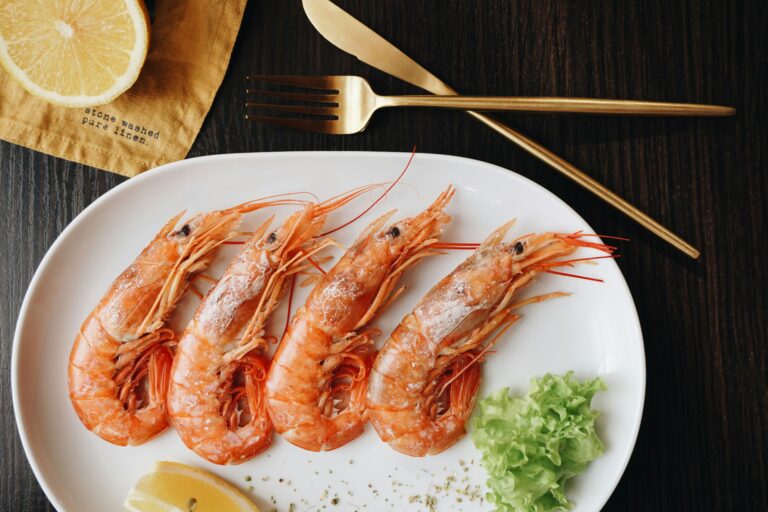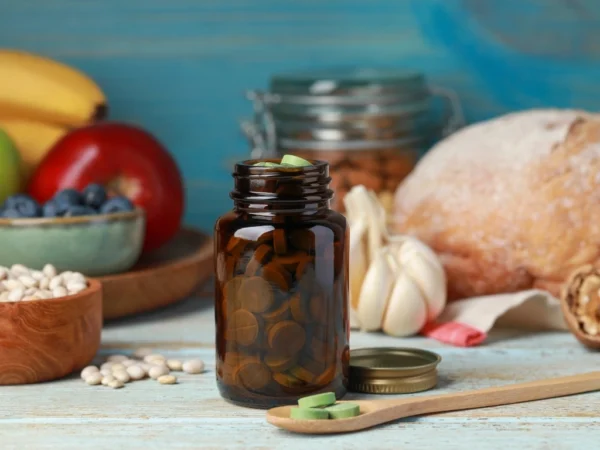The short answer is yes. Shrimp and prawn are good for diabetes management for a number of reasons, and in this article, you will find out why.
Blood sugar control is a very important component of diabetes management, and adding lean protein choices such as shrimp or prawn can be part of a diabetes-friendly diet. Shrimp and diabetes management go hand in hand because shrimp and prawn are low in calories and carbohydrates while being a protein-packed option. These seafood favorites have multiple health benefits that can be useful in managing your diabetes more effectively.

Difference Between Shrimp and Prawn
Shrimp and prawns are often confused with one another given their similar look, and both are commonly used in popular seafood dishes. The largest difference between them is their size. Shrimp are smaller in size than prawn and have a more flexible and easily bendable shell compared to prawn.
Another distinct feature that can be helpful in differentiating between shrimp and prawn would be their claws. Shrimp have claws on two pairs of their legs, and prawns have claws on three pairs of their legs. Shrimp also have one pair of legs that is longer than the other pairs, which can be another useful tool to distinguish between these two crustaceans.
Despite the physical characteristics of shrimp and prawn being slightly different, shrimp and prawn will be used interchangeably in this text and discussion due to their similar nutrition content and health benefits for diabetes.
Nutritional Value of Shrimp
According to the USDA Food Central Database, a 3.5 oz serving of cooked shrimp provides:
- Calories: 99
- Protein: 24g
- Carbohydrates: 0.2g
- Saturated Fat: 0g
- Sodium: 111mg
- Cholesterol: 189 mg
- Potassium: 259 mg
- B12: 1.5 mcg
- Calcium: 70 mg
- Magnesium: 39 mg
- Selenium: 44 mcg
- Zinc: 1.6 mg
Shrimp provides multiple nutrients per serving that can be beneficial in blood sugar control for diabetes management. Lean protein incorporated into a diabetes-friendly diet is a great way to keep blood sugar levels stable, as protein can help slow the rate of digestion of carbohydrates, meaning blood sugar levels are less likely to spike or be elevated after a meal. Shrimp is also low in carbohydrate content, which is another factor to consider when working to improve blood sugars.
Additionally, a portion of shrimp is good for diabetes to meet the recommended intake of healthy fats, otherwise known as omega-3 fatty acids. According to the American Heart Association, most Americans are currently not meeting the suggested intake guidelines for omega-3 fatty acids [1]. The American Heart Association advises consuming two servings of fatty fish weekly to provide the required amount of healthy fats needed from food-based sources. When meeting adequate intake guidelines for this nutrient, omega-3s can help reduce heart disease and stroke risk factors. This is very important in diabetes management, as the American Heart Association has reported that adults who have Type 2 Diabetes Mellitus are twice as likely to develop heart disease or stroke than individuals who do not have diabetes [2]. Focusing on lean protein choices such as shrimp is an excellent way to boost protein while also incorporating healthy fats into a diabetes-friendly and heart-healthy diet approach.
As you can see, a 3.5 oz serving of shrimp is an excellent source of protein and healthy fat. Speaking of shrimp and diabetes, it is also worth mentioning that shrimp provides several important vitamins and minerals. To better understand the specific requirements for daily intake of vitamins and minerals for men and women, a complete guide in Table A1-2 is provided by the USDA Dietary Guidelines for Americans in their 2020-2025 guideline handout [3].
A food-first approach is recommended when trying to increase vitamins and minerals through dietary intake. Vitamins and minerals play an important role in diabetes management to help maintain energy levels, blood sugar control, and reduce inflammation. Both selenium and zinc are minerals that can help keep the immune system healthy and fight inflammation in the body, which is important in diabetes management, as diabetes is associated with slower healing cuts and wounds, making individuals with diabetes more prone to infection.
Certain diabetes medications and the older adult population can be at risk for B12 deficiency, as absorption of B12 declines as we age. B12 plays an important role in the creation of red blood cells and is largely important for proper nerve functioning. Uncontrolled diabetes can have complications, including numbness and tingling, otherwise known as diabetic neuropathy, that is also associated with low levels of B12.
Focusing on a food-first approach and receiving vitamins and minerals through the diet is very important to maintain optimal health and lower the risk of diabetes-related complications. For more information on vitamins and minerals for diabetes management, please consult with your healthcare provider, medical team, and Registered Dietitian. Another tool to consider is The National Institute of Health Office of Dietary Supplements, which provides consumer fact sheets that review recommended intake for vitamins and minerals as well as food-based sources for men and women [4].
Additional Nutrient Considerations of Shrimp or Prawn for Diabetes
The dietary cholesterol found in shrimp is often a topic of debate. According to the American Heart Association, new research guidelines suggest that the dietary cholesterol found in food such as shrimp is generally not supported with an association between elevated blood cholesterol levels and cardiovascular risk factors [5].
Additional studies published in 2018 by Jung Kim et al. and Soliman have further worked to debunk the myths associated with the intake of dietary cholesterol and its potential impact on blood cholesterol levels [6,7].
Rather than focusing on how much dietary cholesterol intake is in related food products, it can be more impactful to focus on choosing lean protein sources, healthy fats, incorporating whole grains and fiber-rich sources such as fruits and vegetables, and low-fat dairy products as a way to manage cholesterol levels with an emphasis on overall diet variety.
How Much Will Eating Shrimp or Prawn Raise Blood Sugar?
The glycemic index of shrimp is 0. The glycemic index is a measure from 0 to 100 of how quickly a food can raise blood sugar levels. Shrimp and prawn do not contain any carbohydrates, meaning these protein choices are unlikely to cause an elevation in blood sugar levels.
Advice on the Use of Shrimp or Prawn in Diabetes
Shrimp is naturally low in fat and low in sodium content. Cooking and preparing them in a way to keep these values low is very important for heart health and diabetes management.
Shrimp and prawn can be prepared in several heart-healthy ways, including:
- Stir frying or sautéing
- Grilling
- Steaming or boiling
- Baking in the oven
- Air frying
Using spray oils such as olive oil or avocado oil is another great choice, as both of these oils in a spray form are low in calories and provide additional healthy fats. It is recommended to limit deep frying shrimp and prawn, as this method of preparation can add calories, fat, and extra salt to the meal. While breading does not have to be completely avoided at all times, it is another source of carbohydrate to be mindful of in the meal. Boiled shrimp can be an extremely flavorful way to prepare shrimp when boiling the shrimp in flavored broth and experimenting with different herbs and spices. Finding ways to add more satisfaction to your meal with lean protein is another tool for improving diabetes and your blood sugars.
Protein is a great way to control blood sugars, as protein can take several hours to digest. This is important in diabetes management, as incorporating more lean protein choices can help keep you fuller for longer and keep blood sugar levels in range.
A habit to start forming for better blood sugar control is to pair your carbohydrate food choices with lean proteins. When pairing the carbohydrates with the protein, digestion will be slowed down, and blood sugars are less likely to rise quickly after a meal. An example of this could be pairing a serving of shrimp or prawn with a serving of a whole grain rice such as quinoa, brown, or wild rice.
FAQ’s:
-
Is shrimp bad for diabetics?
- No, shrimp is an excellent source of lean protein for diabetes. Shrimp provides a source of lean protein, healthy fats, and beneficial vitamins and minerals that can help with blood sugar control. It is important to be mindful of the preparation methods of shrimp, as breading and frying shrimp add extra calories, saturated fat, and sodium that has the potential to impact heart health and blood sugar levels.
-
Can a diabetic eat shrimp?
- Yes, they can. But it is important to keep in mind alternative ways of preparing shrimp in a way that is heart-healthy, such as grilling, sautéing, or air frying. Shrimp can be part of a well-balanced diet for diabetes.
-
Is shrimp healthy for diabetics?
- Yes, shrimp is healthy and can be part of a balanced diet for diabetes, given that shrimp is low in fat, low in sodium, and when prepared in a heart-healthy way, does not increase blood sugar levels or cholesterol. Shrimp provides several important vitamins and minerals that can further help with diabetes management and blood sugar control.
-
Is grilled shrimp good for diabetics?
- Yes, grilling shrimp is one of several ways to prepare this protein choice in a heart-healthy way for diabetes. For more recipe inspiration, please consult with your Registered Dietitian or consider going online to the Diabetes Food Hub, written by the American Diabetes Association, to find diabetes-friendly recipes, including shrimp [8].
-
Is shrimp good for prediabetes?
- Yes, shrimp is good for prediabetics. Shrimp’s GI index score is 0, meaning that this protein choice will not raise blood sugar levels. Shrimp is low in calories, low in fat, and high in protein, which is helpful when making lifestyle changes to lower blood sugar levels.
Conclusions
As you can see, adding shrimp or prawns has multiple benefits for diabetes management. Shrimp is low in calories, high in protein, and provides beneficial vitamins, minerals, and healthy fats that are crucial for blood sugar control and heart health. For more information on how to better manage your diabetes and improve heart health, please consider setting an evaluation with a Registered Dietitian from Health Loft to explore further blood sugar-lowering tips and tricks with evidence-based research to support outcomes.

References
- Williamson, L. (2023, June 30). Are you getting enough omega-3 fatty acids? American Heart Association. Retrieved May 4, 2024, from https://www.heart.org/en/news/2023/07/05/are-you-getting-enough-omega-3-fatty-acids
- Cardiovascular Disease | ADA. (n.d.). American Diabetes Association. Retrieved May 4, 2024, from https://diabetes.org/about-diabetes/complications/cardiovascular-disease
- USDA Dietary Guidelines for Americans 2020-2025 from https://www.dietaryguidelines.gov/. Table A1-2
- The National Institute of Health Office of Dietary Supplements Consumer Facts sheets from https://ods.od.nih.gov/factsheets/list-all/
- Merschel, M. (2023, August 25). Here’s the latest on dietary cholesterol and how it fits in with a healthy diet. American Heart Association. Retrieved May 4, 2024, from https://www.heart.org/en/news/2023/08/25/heres-the-latest-on-dietary-cholesterol-and-how-it-fits-in-with-a-healthy-diet
- Ghada A. Soliman. (2018). Dietary Cholesterol and the Lack of Evidence in Cardiovascular Disease. https://www.mdpi.com/2072-6643/10/6/780
- Jung Eun Kim, & Wayne W. Campbell. (2018). Dietary Cholesterol Contained in Whole Eggs Is Not Well Absorbed and Does Not Acutely Affect Plasma Total Cholesterol Concentration in Men and Women: Results from 2 Randomized Controlled Crossover Studies. https://www.mdpi.com/2072-6643/10/9/1272
- The Diabetes Food Hub by the American Diabetes Association from https://www.diabetesfoodhub.org/













